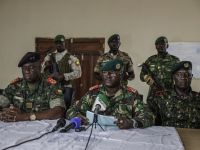President Bush pledged Wednesday to seek congressional approval before taking action against Saddam Hussein and warned allies their "credibility is at stake" as they decide whether to back the United States.
The president will argue his case before the United Nations General Assembly next week after a weekend talks at Camp David with British Prime Minister Tony Blair.
"Saddam Hussein is a serious threat. He is a significant problem and something the country must deal with," Bush said after meeting with congressional leaders at the White House. "Doing nothing about that serious threat is not an option for the United States."
According to AP, the U.S. leader is strongly considering a U.N. Security Council resolution that would set a deadline for Iraq to open its weapons sites to unfettered inspection.
Congressional leaders emerged from their talks with Bush saying they would vote before the Nov. 5 elections on a non-binding resolution about what to do about Iraq. Military action is not a done deal, they agreed.
Bush has invited the congressional leadership to a Cabinet Room briefing on Iraq and dispatched his Pentagon chief to Capitol Hill. The meeting Wednesday was attended by top Democratic and Republican lawmakers — including leaders of the Intelligence, Armed Services and International Relations committees.
U.S. Defense Secretary Donald H. Rumsfeld, who was going to the Capitol on Wednesday to provide closed-door "operational updates" on the war on terrorism, told reporters Tuesday that the administration had secret information supporting its claims that Saddam is close to developing nuclear weapons and must be overthrown, AP reported.
Rumsfeld said it is already publicly known that Iraq wants to acquire nuclear weapons, that nuclear technologies have spread in recent years and that Iraq has ways of obtaining such materials. "And we know some other things, but those are the kinds of things that would come out if and when the president decides that he thinks it's appropriate," Rumsfeld said. "I'll leave that for the coming days and weeks."
Meanwhile, US Secretary of State Colin Powell admitted there are differences in the Bush administration over how to tackle Iraq but insisted President Bush was engaged in "serious" consultations on what action to take.
Powell was also insistent Tuesday that the weapons program being conducted by Iraq under President Saddam Hussein was a real "danger" to the international community.
The secretary of state acknowledged the sharp debate as he spoke to reporters on a plane taking him to the Earth summit in Johannesburg. Iraq "is a very serious issue and we discuss it in a very serious way. "There are lots of views in the administration, outside the administration, up on the Hill, throughout the talk shows, the media, and throughout the international community. "The president is considering it all, and in due course he will let you know how he plans to pursue this problem."
Powell said of the differences within the US leadership: "Some are real, some are perceived, some are overhyped." (Albawaba.com)
© 2002 Al Bawaba (www.albawaba.com)







